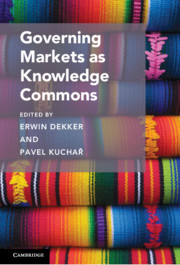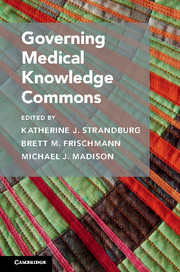GOVERNING KNOWLEDGE COMMONS BOOKS

Governing Misinformation in Everyday Knowledge Commons delves into the complex issue of misinformation in our daily lives. The book synthesizes three scholarly traditions – everyday life, misinformation, and governing knowledge commons – to present 10 case studies of online and offline communities tackling diverse dilemmas regarding truth and information quality. The project originated in a workshop held at the University of Illinois on July 14-15 2022. More information about that workshop is available here.
(Coming soon: read more about Governing Misinformation in Everyday Knowledge Commons)

This collection of case studies takes a critical, balanced look at the data pooling and data governance that are the cores of contemporary “smart city” planning and practice. The project originated in the Smart Cities Workshop: Data, Tech, Institutions, and Trustworthy Governance, held on October 9-10, 2020. More information about that workshop and the Smart Cities as Knowledge Commons project is available here.

Governing Privacy in Knowledge Commons explores how privacy impacts knowledge production, community formation, and collaborative governance in diverse contexts, ranging from academia and IoT, to social media and mental health. Using nine new case studies and a meta-analysis of previous knowledge commons literature, the book integrates the Governing Knowledge Commons framework with Helen Nissenbaum’s Contextual Integrity framework.

Knowledge commons facilitate voluntary private interactions in markets and societies. These shared pools of knowledge consist of intellectual and legal infrastructures that both enable and constrain private initiatives. This volume brings together theoretical and empirical approaches that develop and apply the Governing Knowledge Commons framework to the evolution of various kinds of shared knowledge structures that underpin exchanges of goods, services, and ideas.

Governing Medical Knowledge Commons makes three claims: first, evidence matters to innovation policymaking; second, evidence shows that self-governing knowledge commons support effective innovation without prioritizing traditional intellectual property rights; and third, knowledge commons can succeed in the critical fields of medicine and health.

“Knowledge commons” describes the institutionalized community governance of the sharing and, in some cases, creation, of information, science, knowledge, data, and other types of intellectual and cultural resources. It is the subject of enormous recent interest and enthusiasm with respect to policymaking about innovation, creative production, and intellectual property. Taking that enthusiasm as its starting point, Governing Knowledge Commons argues that policymaking should be based on evidence and a deeper understanding of what makes commons institutions work.
Read more about Governing Knowledge Commons and read the book (Open Access) (the official Oxford UP site for electronic access is here)
ABOUT THE GKC BOOK SERIES
We welcome proposals for new books in this series and expressions of interest in collaborating on GKC research projects. Contact any of the members of the GKC team for more information.
RELATED BOOKS
These are produced by close collaborators of the GKC team.

The free exchange of microbial genetic information is an established public good, facilitating research on medicines, agriculture, and climate change. However, over the past quarter-century, access to genetic resources has been hindered by intellectual property claims from developed countries under the World Trade Organization’s TRIPS Agreement (1994) and by claims of sovereign rights from developing countries under the Convention on Biological Diversity (CBD) (1992). In this volume, the authors examine the scientific community’s responses to these obstacles and advise policymakers on how to harness provisions of the Nagoya Protocol (2010) that allow multilateral measures to support research.

Infrastructure resources are the subject of many contentious public policy debates, including what to do about crumbling roads and bridges, whether and how to protect our natural environment, energy policy, even patent law reform, universal health care, network neutrality regulation, and the future of the Internet. Each of these involves a battle to control infrastructure resources, to establish the terms and conditions under which the public receives access, and to determine how the infrastructure and various dependent systems evolve over time. This book pays much needed attention to understanding how society benefits from infrastructure resources and how management decisions affect a wide variety of interests. The book links infrastructure, a particular set of resources defined in terms of the manner in which they create value, with commons, a resource management principle by which a resource is shared within a community. The infrastructure commons ideas have broad implications for scholarship and public policy across many fields ranging from traditional infrastructure like roads to environmental economics to intellectual property to Internet policy. Economics has become the methodology of choice for many scholars and policymakers in these areas. The book offers a rigorous economic challenge to the prevailing wisdom, which focuses primarily on problems associated with ensuring adequate supply. The book explores a set of questions: what drives the demand side of the equation, and how should demand-side drivers affect public policy? Demand for infrastructure resources involves a range of important considerations that bear on the optimal design of a regime for infrastructure management. The book identifies resource valuation and attendant management problems that recur across many different fields and many different resource types, and it develops a functional economic approach to understanding and analyzing these problems and potential solutions.

The use of open-source software (OSS)—readable software source code that can be copied, modified, and distributed freely—has expanded dramatically in recent years. The number of OSS projects hosted on SourceForge.net (the largest hosting Web site for OSS), for example, grew from just over 100,000 in 2006 to more than 250,000 at the beginning of 2011. But why are some projects successful—that is, able to produce usable software and sustain ongoing development over time—while others are abandoned? In this book, the product of the first large-scale empirical study to look at social, technical, and institutional aspects of OSS, Charles Schweik and Robert English examine factors that lead to success in OSS projects and work toward a better understanding of Internet-based collaboration.
For information about additional related scholarship, knowledge case studies, a bibliography of GKC research, and more, see the Resources page.